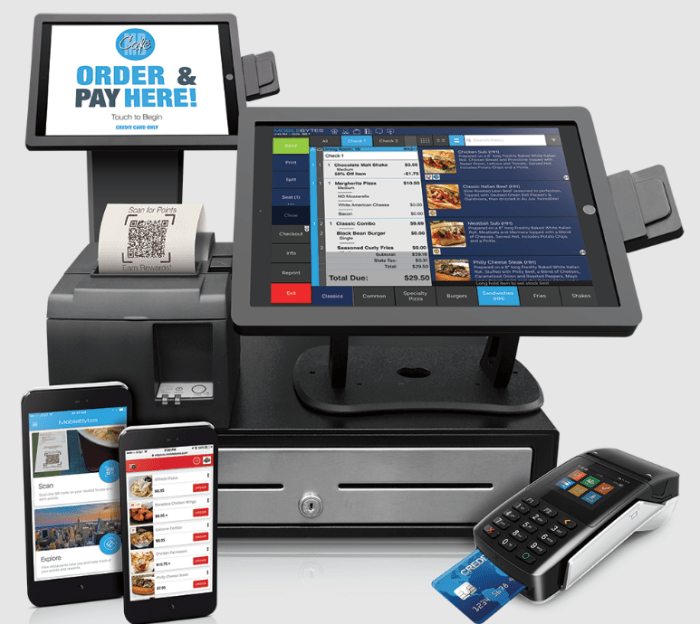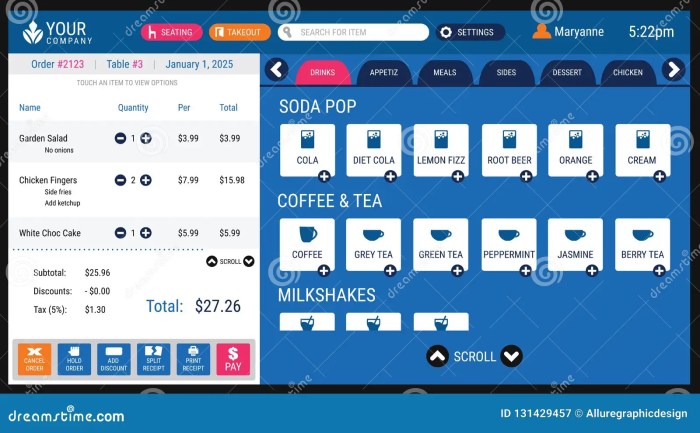Point of sale software system is revolutionizing retail operations, automating transactions and enhancing customer experiences. From streamlining inventory management to facilitating seamless payment processing, these systems are crucial for modern businesses. They empower retailers to gain valuable insights into sales trends, customer preferences, and operational efficiency.
These systems often integrate with various other business applications, allowing for a comprehensive view of the entire operation. This integration helps in making data-driven decisions, optimizing staffing, and ultimately improving profitability.
Point of sale (POS) software systems are essential tools for businesses of all sizes, streamlining the sales process and providing valuable data insights. This comprehensive guide dives deep into the world of POS systems, exploring their functionalities, benefits, and crucial considerations for implementation. We’ll cover everything from basic functionalities to advanced features, ensuring a clear understanding for both beginners and seasoned business owners.
What is Point of Sale (POS) Software?
A POS system is a software application designed to manage transactions at the point of sale. It essentially acts as the central nervous system for a retail store, restaurant, or any other business that sells goods or services. Beyond simple transaction processing, modern POS systems offer a wealth of features, including inventory management, customer relationship management (CRM), reporting, and more.
Understanding the diverse functionalities is key to maximizing the potential of a POS system.
Key Features of POS Software
- Transaction Processing: This is the core function, enabling quick and accurate processing of sales transactions, including payment types (credit cards, debit cards, cash). Advanced systems can handle complex pricing structures and discounts.
- Inventory Management: POS systems track inventory levels, helping businesses avoid stockouts and overstocking. Real-time inventory updates are critical for efficient operations.
- Reporting and Analytics: POS systems generate reports on sales, inventory, customer trends, and other key metrics. These insights are invaluable for informed decision-making.
- Customer Relationship Management (CRM): Many modern POS systems integrate CRM features, allowing businesses to track customer interactions, preferences, and purchase history. This enhances customer loyalty and personalized service.
- Customer Loyalty Programs: Built-in loyalty programs incentivize repeat business, fostering customer relationships and driving sales.
- Employee Management: Some POS systems incorporate employee scheduling, time tracking, and payroll functionalities.
- Kitchen Display Systems (KDS): For restaurants, a KDS displays orders for kitchen staff, ensuring faster preparation and minimizing errors.
Types of POS Software
The market offers a variety of POS software options, catering to different business needs and budgets. Understanding the different types can help you choose the right system for your business.
Cloud-Based POS
Cloud-based POS systems are hosted on remote servers, accessible via the internet. This eliminates the need for expensive hardware and allows for easy scalability and updates. Cloud solutions often boast seamless integration with other business tools.
On-Premise POS
On-premise POS systems are installed and maintained on the business’s own servers. This option offers greater control and customization, but requires more upfront investment and ongoing maintenance.
Choosing the Right POS System
Selecting the right POS system is crucial for optimal business operations. Consider these factors:
Budget
POS systems vary significantly in price, from affordable basic solutions to more expensive, feature-rich options. Establish a budget before evaluating different options.
Scalability
As your business grows, the POS system must adapt. Choose a system that can scale to accommodate future needs.
![Point-of-Sale (POS) Software: Here’s All you Need to Know [Updated] Point of sale software system](https://two.vivodesiderio.com/wp-content/uploads/2025/04/Point-of-Sale-Software-1920x1080-1.png)
Source: co.uk
Integration Needs, Point of sale software system
Consider integration with other business software, such as accounting software, inventory management systems, or CRM platforms.
Benefits of Using POS Software: Point Of Sale Software System
Implementing a POS system offers a range of benefits:

Source: plazsales.com
- Improved Accuracy and Efficiency
- Reduced Errors
- Real-time Data and Insights
- Enhanced Customer Experience
- Increased Profitability
Frequently Asked Questions (FAQ)
Here are some frequently asked questions about POS software systems:
- Q: How much does POS software cost?
A: POS software costs vary greatly depending on features, functionalities, and vendor. Contact vendors for specific pricing.
- Q: What are the common POS software providers?
A: Popular providers include Square, Toast, Lightspeed, and others. Research reviews and compare options.
- Q: How long does it take to implement a POS system?
A: Implementation timelines depend on the complexity of the system and your business needs. Plan accordingly.
Disclaimer: This article provides general information and is not financial advice. Consult with relevant professionals for specific business needs.
Conclusion
Implementing a robust POS system is a strategic investment that can significantly enhance business operations. By carefully considering the features, types, and benefits, businesses can select a system that aligns with their specific needs and goals. This leads to increased efficiency, accuracy, and profitability, ultimately boosting the bottom line.

Source: dreamstime.com
Ready to elevate your business? Contact us today to explore how a tailored POS solution can optimize your operations and drive growth.
Call to Action (CTA): Request a Demo to see how our POS software can transform your business.
In conclusion, point of sale software systems are essential for modern retailers seeking to enhance efficiency, improve customer service, and drive profitability. Their capabilities extend far beyond basic transaction processing, offering valuable insights and automation that can transform the entire business model.
Popular Questions
What are the common security concerns associated with point of sale software systems?
Security is paramount. Robust systems employ encryption to protect sensitive customer data during transactions. Regular software updates and strong passwords are also critical security measures.
How do these systems handle different payment methods?
Modern point of sale systems support various payment methods, including credit cards, debit cards, mobile payments, and even cryptocurrency in some cases. The systems are designed to securely process these diverse options.
What are the typical costs involved in implementing a point of sale software system?
Implementation costs vary based on the specific features and functionalities required. Factors such as the number of users, required integrations, and customization options all influence the overall price.
Can the software be customized to meet specific business needs?
Many point of sale systems offer customization options, allowing businesses to tailor the software to their specific workflows and processes. This adaptability is a key advantage for different retail setups.